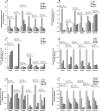Monosodium L-glutamate and fats change free fatty acid concentrations in intestinal contents and affect free fatty acid receptors express profile in growing pigs
- PMID: 31360149
- PMCID: PMC6642617
- DOI: 10.29219/fnr.v63.1444
Monosodium L-glutamate and fats change free fatty acid concentrations in intestinal contents and affect free fatty acid receptors express profile in growing pigs
Abstract
Background: Obesity and its related metabolic syndrome continue to be major public health problems. Monosodium L-glutamate (MSG) may cause metabolic diseases such as obesity. Meanwhile, the Chinese population has undergone rapid transition to a high-fat diet. There is little information available on the effect of MSG and fat alone, or in combination, on free fatty acids (FFAs), lipid metabolism and FFA receptors.
Objective: The aim of this study was to evaluate the effects of MSG and fat alone, or in combination, on intestinal luminal FFAs and expression of gastrointestinal FFA receptors. The aim was also to test whether dietary fat and/or MSG could affect expression of genes related to fatty acid metabolism.
Design: A total of 32 growing pigs were used and fed with four iso-nitrogenous and iso-caloric diets. Pigs in the four treatments received diets with one of two fat concentrations levels (4.4 and 9.4%) and one of two MSG dose levels (0 and 3%), in which most of the fat were brought by soybean oil. The concentration of short chain fatty acids (SCFAs) in cecum and colon, long chain fatty acids (LCFAs) in ileum, cecum and colon, and FFAs receptors expression in hypothalamus and gastrointestinal tract were determined.
Results: MSG and/or fat changed intestinal luminal SCFAs, levels of LCFAs, and showed an antagonistic effect on most of LCFAs. Simultaneously, MSG and/or fat decreased the expression of FFA receptors in hypothalamus and gastrointestinal tract. MSG and/or fat promoted fat deposition through different ways in back fat.
Conclusion: Our results support that MSG and/or fat can alter intestinal luminal FFAs composition and concentration, especially LCFAs, in addition, the expression of FFA receptors in ileum and hypothalamus could be decreased. Moreover, MSG and/or fat can promote protein deposition in back fat, and affect the distribution and metabolism of fatty acids in the body tissues and the body's ability to perceive fatty acids; these results provide a reference for the occurrence of fat deposition and obesity caused by high-fat and monosodium glutamate diet.
Keywords: fat; free fatty acid; free fatty acids receptors; intestinal luminal; lipid metabolism; monosodium L-glutamate.
Conflict of interest statement
The authors declare that they have no competing interests.
Figures




References
-
- Song L, Lu J, Song H, Liu H, Zhang W, Zhao H. Study on the relationship between obesity and lipid metabolism in children and adolescent in yinchuan. J Hyg Res 2014; 43(5): 779–83. Available form: http://kns.cnki.net/kns/detail/detail.aspx?FileName=WSYJ201405015&DbName... - PubMed
-
- Feigin VL, Roth GA, Naghavi M, Parmar P, Krishnamurthi R, Chugh S, et al. . Global burden of stroke and risk factors in 188 countries, during 1990–2013: a systematic analysis for the Global Burden of Disease Study 2013. Lancet Neurol 2016; 15(9): 913–24. doi: 10.1016/S1474-4422(16)30073-4 - DOI - PubMed
LinkOut - more resources
Full Text Sources

